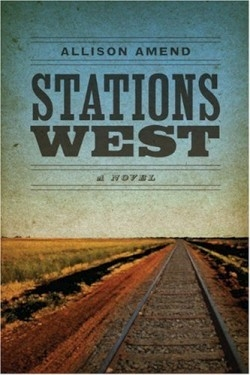Stations West (Yellow Shoe Fiction)
Describing poetry, Seamus Heaney said, “my lee is deeply tilled.” He compared meter and form to the patterns of agriculture, watching how a poem appeared on a page like furrows. Alison Amend’s new novel, Stations West, the story of the first Jewish man to settle in Oklahoma territory, has the same earthy feel.
The progenitor of three American generations, Boggy Haurowitz is a modest man. He arrives in Oklahoma in 1859, several years before the territory is ratified as a state. He wears “the one pair of trousers he owns,” and “a slouch hat taken off a dead man somewhere in eastern Missouri.” His life marred by tragedy, he takes to the road; his addiction to wandering is passed on to his son and grandson. The family inheritance of loss touches every part of Stations West, with each generation questing for the missing piece of happiness.
Amend uses subtle characterization and historical touches to bring both Boggy and the time period to life. Riding on a freshly-invented steam engine, Boggy’s grandson Garfield sees, “burlap bags of grain and meal, barrels of substances unknown, packages tied with twine and wrapped in coarse paper, bags of mail, large cast-off rusted pieces of farm equipment, dull and broken.” Technology and clothing change, fortunes appear and vanish, suggesting the steady transformations of history.
The majority of the novel is told from grandson Garfield’s perspective, and every page is a treat. Part Jewish and part Cherokee, Garfield is American to his core. He feels the frustration, ambition, and loyalty that shaped America. As his family expands, Garfield pushes his luck, traveling the new railroads and seeking adventure. He is furious and funny, wise and pigheaded—a vibrant character, and the beating heart of this family epic. Best of all, Amend presents him as the inevitable product of his unlikely beginnings.
Stations West is distinct from the Western genre; although it realistically describes the gritty world of hardscrabble farmers, fancy whores, and prospectors, Stations West sidesteps the clichés. Surprises await the reader at every turn, and themes of greed, faith, discovery, and family keep the novel out of Louis L’Amour territory. Fans of Louise Erdrich’s A Plague of Doves will find a lot to like in Amend’s work.
The landscape of the West gives birth to a fabulous mythology, and, like Seamus Heaney, we watch the plow blade—of the Haurowitz family, of our nation—carve its deep furrows into the new world.
Disclosure: This article is not an endorsement, but a review. The publisher of this book provided free copies of the book to have their book reviewed by a professional reviewer. No fee was paid by the publisher for this review. Foreword Reviews only recommends books that we love. Foreword Magazine, Inc. is disclosing this in accordance with the Federal Trade Commission’s 16 CFR, Part 255.

